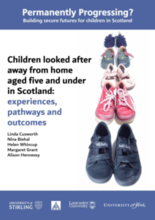This report has been completed as one part of the Permanently Progressing? study. The study is the first in Scotland to investigate decision making, permanence, progress, outcomes, and belonging for children who became ‘looked after’ at home or were placed away from their birth parents (with kinship carers, foster carers or prospective adopters) when they were aged five and under. Phase One ran from 2014-18 and was designed to be the first phase in a longitudinal study following a large cohort of young children in to adolescence and beyond. The research was funded by a legacy, and Phase One was undertaken by a team from the universities of Stirling, York, and Lancaster, in conjunction with the Adoption and Fostering Alliance (AFA) Scotland. It is anticipated that Phase Two will commence in 2020.
A core focus of the overall study is the concept and experience of permanence, and within Scotland there are different routes to permanence for children, including remaining with or being reunified to birth parents.
The aim of this particular strand was to investigate the experiences, pathways, and outcomes of children who became looked after away from home, together with the factors associated with achieving permanence. In this context, the concept of permanence refers to physical stability (a child remaining with a committed, long-term caregiver), legal permanence (a caregiver having legal responsibility for a child), and an emotional attachment between a child and the caregiver, which together may give children a sense of emotional or ‘felt’ security, continuity and belonging.
This report presents important new findings on the characteristics, histories, decision making, and outcomes for 433 children who became looked after away from home during 2012-13, and remained (or were again) looked after away from home one year later. The broader study has four other strands.

